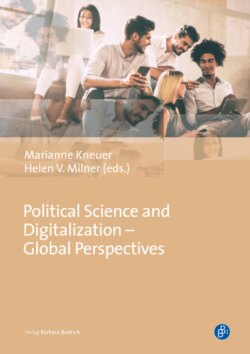Читать книгу Political Science and Digitalization - Global Perspectives - Группа авторов - Страница 41
На сайте Литреса книга снята с продажи.
3 [57] Teaching of political science
ОглавлениеThe digital revolution has yet to play a major role in Paraguay’s higher education, as digital tools are still only marginally used. There is little integration of Information and Communication Technologies (ICT) in the classroom or as a didactic element outside of it, and they are often used only as an addition to the vertical transmission of information.
Although universities do have the technological resources to use virtual platforms to organize courses –such as the Massive Open Online Courses (MOOCs) used for distance education programs in other areas–, the effective use of this technology is not widespread and there are very few professors who use it for this purpose in the area. The use of the Internet in particular is directed more towards the search for bibliography as a complement to the basic materials of each class or material not available in printed form at the universities. At the same time, there is a tendency to increase formal online communication between professors and students, while also increasing the informal interaction between them. However, establishing digital means of communication depends on the will of each teacher and cannot be considered a regular practice. The incipient use of digital tools for teaching affects political science, though in a similar way to other areas of knowledge.
There are no major differences in terms of digital infrastructure between the mentioned universities. Internet access in these places, although free, it is not strong enough to be used as didactic element; Internet speed is not fast or stable enough for video-conferences, online access to audio-visual materials, or the search of bibliographical sources in real time. For these reasons, professors who want to take advantage of digital tools need to use their private resources to find and obtain all the material that they consider necessary for their classes beforehand. There are also no policies to introduce these tools to the higher learning process in a systematic manner.
The teaching of research methods does not make full use of digital resources for data analysis either. Although universities do have computer labs, they do not promote the use of digital instruments to analyze quantitative or qualitative data. The use of digital resources as methodological tools is limited to its introductory level, if used at all, as a reflection of the dated education practices of those responsible for teaching them. Thus, the use of information technology in political science research faces challenges on several levels: the programs are not research-oriented, professors that usually teach them have not been specifically educated in the area, while the few of those that have been educated in political science hardly ever do research in the areas they teach. Furthermore, there isn’t any specialized library in political science in the country that could have a digital counterpart, and neither professors nor students have access to databases, online libraries or scientific journals, unless they are able to access them by their own means.
However, students in Paraguay do have access to digital teaching platforms developed by foreign institutions. Through the virtual availability of programs related to political science that are unavailable in the country, Paraguayan students who are unable to travel in order to further their education abroad take advantage of virtual platforms in order to improve their education, which enables them to become part of an international academic community in a way that would not be possible otherwise. Such platforms offer access to curricula and bibliography that are also used by other students and professionals when shared, thus generating positive externalities for the development of the discipline in the country.
Regarding aspects of curricular content, topics related to the digital revolution or the political importance of the digitalization of information have not yet been included as subjects in political science programs. This is mainly due to the fact that such programs have not been updated since the ICT gained importance as vehicles for political activism, or as a [58] tool used to strengthen the links of representation, which happened in recent years (Welp 2016: 220).
However, some references to this phenomenon have been observed in different subjects in both universities. Subjects related to interest groups, public opinion and elections in the Catholic University refer to the power of the media in agenda setting as well as the Internet as a basic component of the information society. In the case of the National University, the program includes the subject “Computer science and political science”, though it’s rather intended to train students in the use of digital tools as resources for work.
The reality described above presents a context of greater potential for the development of political science in Paraguay as a byproduct of growing access to academic resources via ICT. Such opportunities, however, will bear no effect as long as there is no optimal use of the resources at hand; further, backwardness is inevitable as a result of the current way the discipline is taught and the infrastructure made available by the universities.
There are possibilities for improvement in sight, due to the process of certification and accreditation of the programs that has been initiated at the national level. So far, no political science program in the country is certified by the National Agency for the Evaluation and Accreditation of Higher Education (ANEAES)6, similarly to other programs of the social sciences and humanities. Thus, if a policy of certifying university programs becomes standard practice in time, the specialization of political science would occur as a result of such process.
